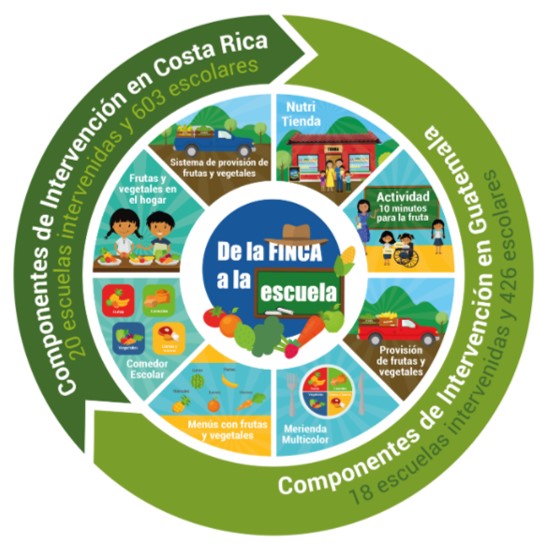“From the farm to school”
presented results in Costa Rica and Guatemala
Guatemala City, January 6, 2020

With the sponsorship of the Canadian Cooperation (International Development Research Center), INCAP carried out the study “From Farm to School” that evaluated the impact of a multi-component and intersectoral program to increase in a sustainable way, the provision and the consumption of fruits and vegetables in public schools in the metropolitan areas of Guatemala and Costa Rica.
The results of this study, which were presented at INCAP headquarters in Guatemala City, and in the auditorium of the Research City at the University of Costa Rica, demonstrated the feasibility of a program on the food system, which unites local production to meet the school demand and thus increase the consumption of fruits and vegetables, seeking to establish healthy eating habits at an early age.
A healthy and sustainable diet requires a physical, varied, sufficient and continuous access to fruits and vegetables. A healthy diet contributes to eradicating malnutrition in all its forms. Ending malnutrition is a key condition for promoting the development of our countries.
The experience of the From Farm to School project in Guatemala and Costa Rica should motivate action, cooperation and innovation, including critical review of school feeding plans and programs. Identifying the barriers that prevent the provision of a healthy diet, as well as factors that facilitate its provision and availability, are key to the sustainability of these programs that will bring benefits to health, the economy and the environment.
Overweight and obesity is an epidemic that affects at least one third of schoolchildren in the region, with a tendency to increase alarmingly, so the search for and implementation of programs that help minimize this figure is urgent.
The importance of promoting the regular consumption of fruits and vegetables is recognized globally, which seeks to positively impact healthier and more sustainable food systems.
Download the document: Policy brief
















